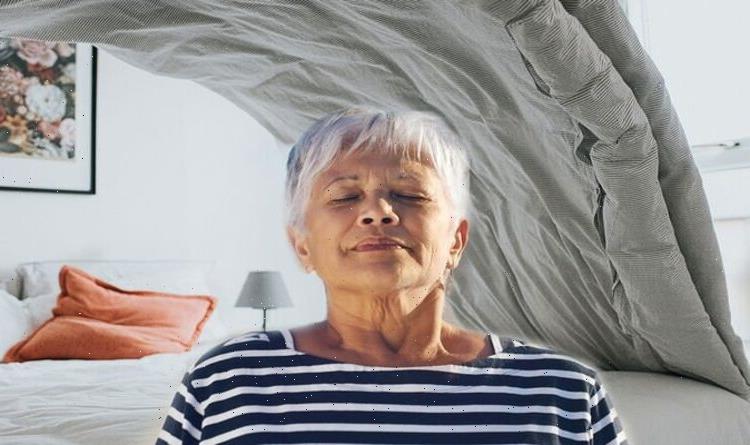Live longer: Best sleeping position to reduce heart attack, diabetes and Alzheimer’s risk
Centenarian reveals SURPRISE drink that helps her live longer
We use your sign-up to provide content in ways you’ve consented to and to improve our understanding of you. This may include adverts from us and 3rd parties based on our understanding. You can unsubscribe at any time. More info
Obstructive sleep apnoea is linked to a higher risk of hypertension, heart attacks, stroke, diabetes and many other chronic conditions. Researchers from the University of Missouri School of Medicine have found that untreated OSA also accelerates the biological ageing process, and that appropriate treatment can slow or possibly reverse the trend. Age acceleration testing involves a blood test that analyses DNA and uses an algorithm to measure a person’s biological age. With this in mind, what is the most beneficial sleeping position to help reduce age-related diseases?
The phenomenon of a person’s biological age surpassing their chronological age is called “epigenetic age acceleration,” and is linked to overall mortality and to chronic diseases.
“Age acceleration isn’t unique to OSA — it can be caused by a variety of environmental factors like smoking, poor diet or pollution,” said Dr Rene Cortese, assistant professor in the Department of Child Health and the Department of Obstetrics, Gynaecology and Women’s Health.
“In Western culture, it’s not uncommon for people to experience epigenetic age acceleration, but we wanted to know how OSA affects systemic age acceleration compared to those who don’t suffer from this condition.”

Sleep expert from Eachnight, Kiera Pritchard reveals sleeping on your side could be one of the best sleeping positions and may even boost longevity.
Kiera said: Perhaps the biggest advantage to sleeping on your side instead of your back is that side sleeping can prevent snoring.
“Back sleeping can often lead to worsened snoring and obstructive sleep apnoea.
“Your jaw, tongue, and other soft tissues collapse in your throat when you lie on your back. The collapsed soft tissue narrows your airway and makes breathing more difficult, thus resulting in snoring.”
In the study, Cortese’s team studied 16 adult non-smokers who were diagnosed with OSA and compared them to eight control subjects without the condition to assess the impact of OSA on epigenetic age acceleration over a one-year period.
After a baseline blood test, the OSA group received continuous positive airway pressure (CPAP) treatment for one year before being tested again.
“Our results found that OSA-induced sleep disruptions and lower oxygen levels during sleep promoted faster biological age acceleration compared to the control group,” Cortese said.
“However, the OSA patients who adhered to CPAP showed a deceleration of the epigenetic age, while the age acceleration trends did not change for the control group.
“Our results suggest that biological age acceleration is at least partially reversible when effective treatment of OSA is implemented.”

The health benefits of sleeping on your side have been found to not only help reduce sleep apnoea but can also aid in a number of other health issues.
“Sleeping on your side prevents stomach acid from rising and holds stomach contents in place better than back or stomach sleeping,” added Kiera.
“When you lie flat on your front or back, your stomach’s acid can flow up your oesophagus, causing damage.
“However, lying on your side ensures gravity will keep your stomach acid from flowing upward. Digestive issues side sleeping can prevent or manage include heartburn and acid reflux.”
Clears Out Brain Toxins
Your body has a waste system known as the glymphatic system. Its job is to clear out any waste in the brain and may also help deliver compounds such as glucose, lipids, amino acids, and neurotransmitters.
Kiera noted: “Your sleep position can influence its effectiveness.
“The system operates more efficiently when you lie on your side than on your back or front.
“Scientists have suggested that its waste disposal function may play a key role in preventing neurodegenerative diseases – for example, Alzheimer’s disease is linked to the pile up of proteins in the brain.”
Another 2015 study further bolstered this revealing why sleeping on your side may be the most beneficial sleeping position.
Source: Read Full Article
